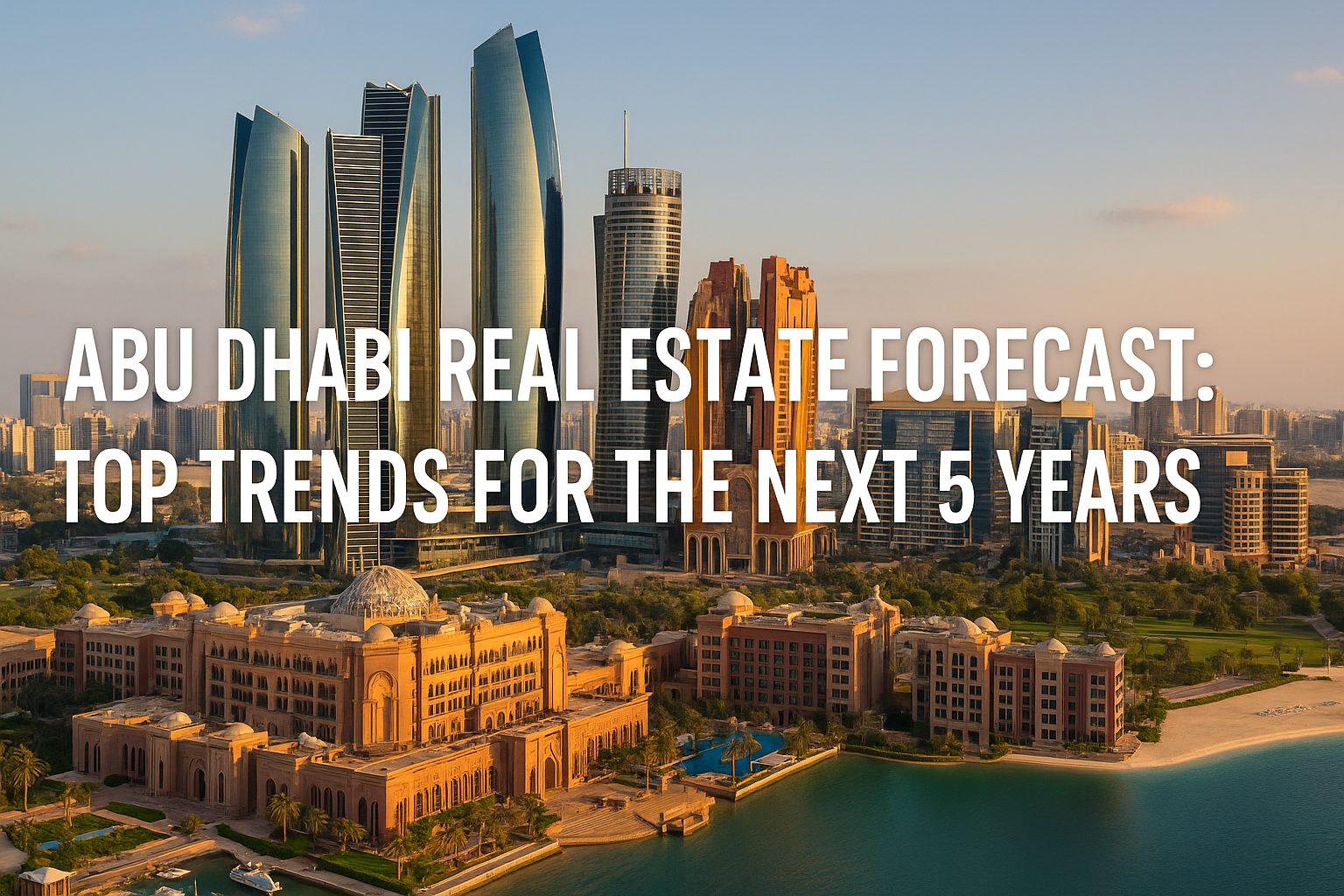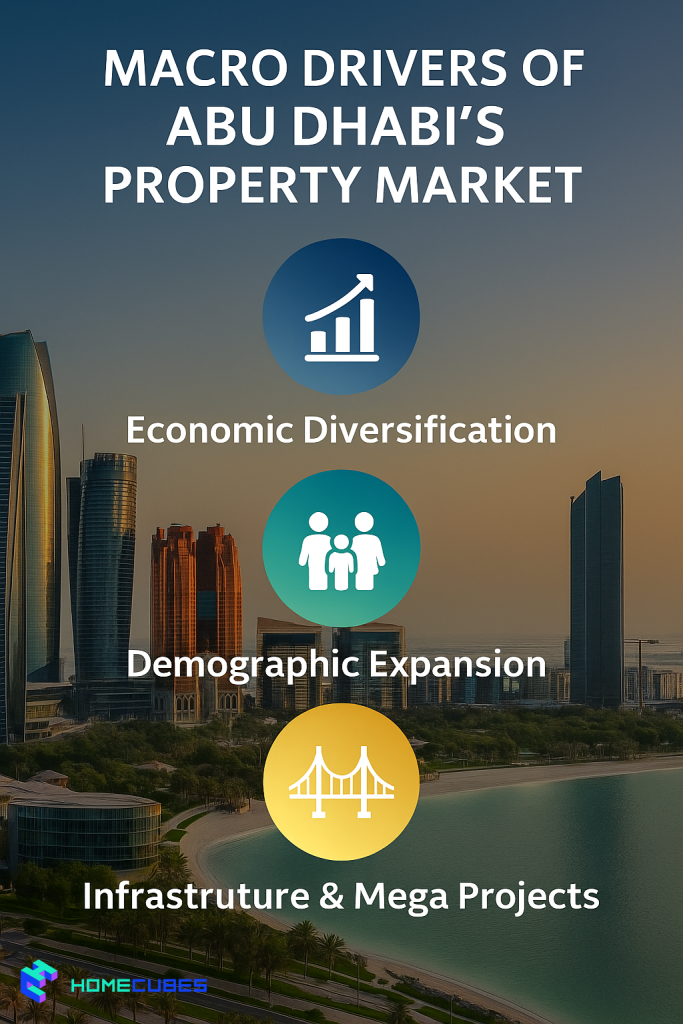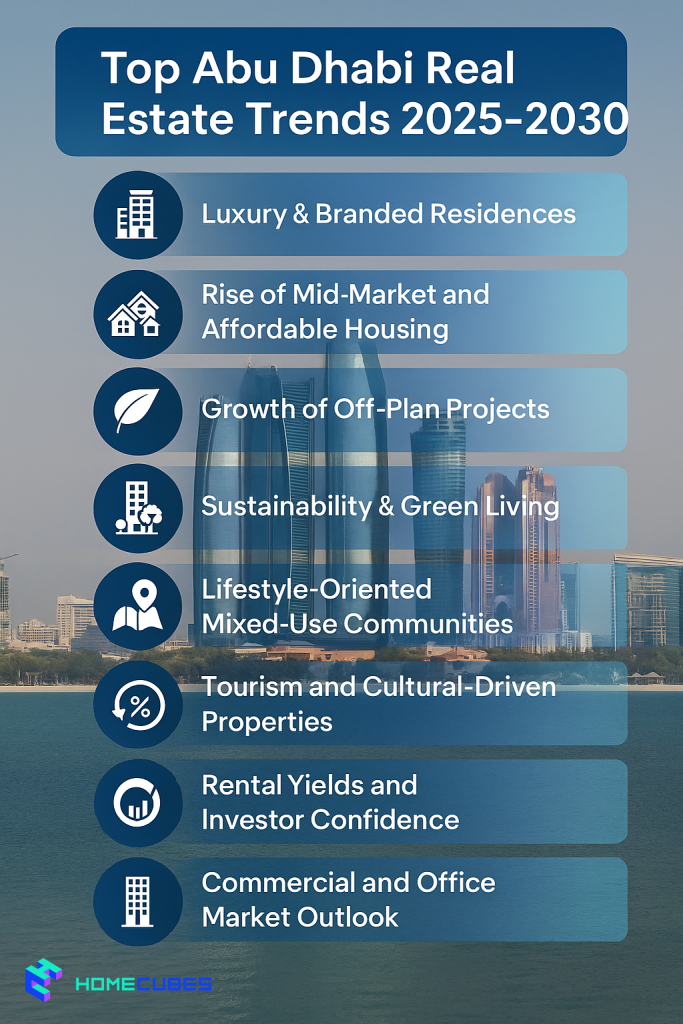

Table of Contents
- Introduction
- Macro Drivers of Abu Dhabi’s Property Market
- Economic Diversification
- Demographic Expansion
- Infrastructure & Mega Projects
- Top Abu Dhabi Real Estate Trends 2025–2030
- Luxury & Branded Residences
- Rise of Mid-Market and Affordable Housing
- Growth of Off-Plan Projects
- Sustainability & Green Living
- Lifestyle-Oriented Mixed-Use Communities
- Tourism and Cultural-Driven Properties
- Rental Yields and Investor Confidence
- Commercial and Office Market Outlook
- Case Study: Saadiyat Island’s Transformation
- Risks and Challenges Ahead
- Mistakes to Avoid When Investing in Abu Dhabi
- Fees and Charges in Abu Dhabi Real Estate
- Outlook Through 2030
- Frequently Asked Questions (FAQs)
- Final Thoughts
- Partner with Homecubes
Introduction
Abu Dhabi’s real estate sector has steadily matured into one of the Middle East’s most secure and transparent property markets. While Dubai often dominates international headlines, like the property price surge in Dubai in H1 2025, the capital has carved a unique position through sustainability initiatives, cultural investments, and a measured supply pipeline.
According to the Knight Frank Abu Dhabi Residential Market Review Winter 2024-25, residential prices in the capital grew by 17.3% in 2024, with villas recording the strongest appreciation (Knight Frank PDF). Rental values also surged, particularly in prime locations such as Saadiyat Island, Al Reem Island, and Al Raha Beach.
Went to Abu Dhabi for the weekend to check out some real estate.
Everyone talks about Dubai, but Abu Dhabi is super underrated.
New vlog is out in 2 hours. pic.twitter.com/C8qqeUz55g
— Miles Deutscher (@milesdeutscher) July 1, 2025
These growth patterns demonstrate resilience and indicate that the next five years will bring sustained opportunity. This article explores the Abu Dhabi Real Estate Trends 2025–2030, offering investors, residents, and developers a roadmap for success in the capital’s evolving property market.
Macro Drivers of Abu Dhabi’s Property Market

Economic Diversification
Abu Dhabi Vision 2030 places economic diversification at its core. By focusing on knowledge-based industries, renewable energy, culture, and finance, the emirate has reduced reliance on oil revenues.
- The non-oil economy expanded by 6.1% in 2024, the strongest pace in a decade.
- Growth in tourism, culture, and logistics is creating demand for both commercial and residential real estate.
According to Colliers’ UAE Real Estate Property Review Q2 2025, Abu Dhabi currently has USD 758 billion worth of active development projects, reinforcing its long-term growth strategy (Colliers Q2 2025).
Demographic Expansion
Population growth is another key factor. Expatriates account for the majority of residents, and long-term visas such as the Golden Visa are encouraging professionals and entrepreneurs to settle in the emirate.
By 2030, Abu Dhabi’s population is projected to surpass 3.5 million, fueling consistent demand for both luxury and mid-market housing.
Infrastructure & Mega Projects
The government’s investment in culture, leisure, and connectivity is reshaping real estate demand.
- Cultural investments: The Louvre Abu Dhabi, Guggenheim Abu Dhabi (under construction), and Zayed National Museum reinforce Saadiyat Island as a global cultural hub.
- Tourism growth: Yas Island, home to theme parks and luxury resorts, is expected to attract over 48 million visitors annually by 2030.
- Transport expansion: New highways, metro planning, and waterfront developments are opening up suburban zones for residential investment.
Top Abu Dhabi Real Estate Trends 2025–2030
The UAE is progressing through the real estate development across the country, so does the capital city, Abu Dhabi. Top trends in Abu Dhabi real estate market that are detailed below have shaped top hotspots in Abu Dhabi real estate market for capital growth 2025.

Luxury & Branded Residences
Luxury property is expected to outperform over the next five years.
- Saadiyat Island: Average villa prices rose by 26% in 2024, according to Knight Frank’s data (Knight Frank H1 2025).
- Yas Island: Villas and apartments tied to leisure infrastructure continue to attract high-net-worth buyers.
- Branded residences: Projects linked with global hospitality groups—such as Nobu Residences—are becoming a new benchmark for exclusivity.
Rise of Mid-Market and Affordable Housing
As luxury prices surge, mid-income communities are gaining traction.
- Al Shamkha and Mohammed Bin Zayed City are among the fastest-growing mid-market zones.
- These areas appeal to families seeking affordability while still accessing city amenities.
- Rental yields in such districts often exceed 6.5%, higher than in premium zones.
Growth of Off-Plan Projects
The supply pipeline is dominated by off-plan developments.
- In 2025, over 10,400 new units will be delivered—triple the number in 2024 (Cushman & Wakefield Report).
- Flexible payment plans and staged completion dates make off-plan attractive for both investors and end-users.
- Off-plan sales accounted for 65% of total transactions in Q2 2025, highlighting their popularity.
Sustainability & Green Living
Environmental sustainability is no longer optional.
- Masdar City remains the benchmark for eco-friendly urban living.
- Estidama certification is becoming a competitive differentiator.
- Developers are integrating cycling paths, smart energy systems, and wellness-focused layouts into communities.
Lifestyle-Oriented Mixed-Use Communities
- Projects like Al Maryah Island combine luxury residences with business districts, healthcare, and retail.
- Such developments reduce commuting times and appeal to younger professionals seeking integrated living.
Tourism and Cultural-Driven Properties
- Short-term rentals, holiday homes, and serviced apartments are rising in demand.
- Saadiyat’s cultural district and Yas Island’s leisure attractions are at the center of this growth.
Rental Yields and Investor Confidence
- Abu Dhabi’s average rental yields stand at 6%, higher than many global property hubs.
- Mid-market apartments and villas often generate more consistent rental returns than luxury units.
- High-end properties, however, promise stronger long-term capital appreciation.
Commercial and Office Market Outlook
- Grade A office occupancy is above 89%, with rental rates increasing by 11% year-on-year (Cushman & Wakefield Report).
- New supply is limited, meaning rents are expected to rise further over the next five years.
Case Study: Saadiyat Island’s Transformation
Saadiyat Island is a model of how strategic planning drives real estate success.
- Cultural impact: The Louvre Abu Dhabi has positioned Saadiyat as a global cultural capital.
- Luxury appeal: Villas and branded residences offer exclusivity unmatched elsewhere.
- Performance: According to Knight Frank, Saadiyat villas saw 31% annual rental growth in 2024, making it the best-performing sub-market.
The island illustrates how culture, sustainability, and luxury combine to deliver consistent appreciation.
Risks and Challenges Ahead
Despite strong fundamentals, risks remain:
- Oversupply in off-plan apartments could create absorption challenges.
- Construction cost inflation may delay projects or push prices upward.
- Geopolitical risks and oil market volatility could impact sentiment.
- Interest rates will directly affect mortgage affordability.
Mistakes to Avoid When Investing in Abu Dhabi
- Focusing only on price without evaluating location and connectivity.
- Ignoring developer track records in off-plan sales.
- Assuming short-term speculation will deliver high returns.
- Forgetting to account for registration and service charges.
Fees and Charges in Abu Dhabi Real Estate
- Registration Fee: 2% of property value.
- Mortgage Registration: 0.1% of loan amount.
- Brokerage Commission: 2%.
- Service Charges: AED 10–25 per sq. ft. annually depending on the community.
Understanding these fees is essential for accurate ROI calculations.
Outlook Through 2030
- Prices are forecast to rise 72–83% by 2033, with luxury areas exceeding 100% appreciation.
- Rental demand will remain strong due to population growth and cultural tourism.
- Eco-certified developments will become mainstream, commanding premiums.
- Abu Dhabi will remain one of the GCC’s most attractive long-term investment destinations.
Frequently Asked Questions (FAQs)
Q1: Is Abu Dhabi safer for property investment than Dubai?
Yes, Abu Dhabi offers more stability and regulation, though Dubai provides higher liquidity.
Q2: Which areas will deliver the best ROI?
Saadiyat and Yas Island for luxury growth; Al Shamkha and Mohammed Bin Zayed City for yield.
Q3: Can foreigners buy freehold property in Abu Dhabi?
Yes, in designated investment zones foreigners enjoy full ownership rights.
Q4: What are the average rental yields?
Between 5.9% and 6.3%, with mid-market often higher.
Q5: Are off-plan projects a good choice?
Yes, particularly when purchased from reputable developers.
Q6: Will sustainability affect property prices?
Absolutely—green-certified projects will outperform in both demand and pricing.
Q7: Is property investment linked to the Golden Visa?
Yes, property purchases worth AED 2 million or more qualify.
Q8: What risks should I be aware of?
Oversupply, rising costs, and potential global economic instability.
Q9: What are typical service charges?
AED 10–25 per sq. ft. annually depending on amenities.
Q10: What’s the outlook for commercial property?
Prime office demand will remain high, with rents projected to grow steadily.
Final Thoughts
The Abu Dhabi Real Estate Trends 2025–2030 highlight a market shaped by stability, culture, and sustainability. Luxury communities promise strong appreciation, while mid-market zones provide consistent yields.
What distinguishes Abu Dhabi is its forward-looking approach—integrating culture, green standards, and economic diversification. For investors, this means opportunities across multiple segments, provided choices are backed by solid fundamentals.
In short, Abu Dhabi’s property market offers both security and growth, making it one of the most compelling investment destinations in the region.
Partner with Homecubes
At Homecubes, we translate market trends into actionable strategies for investors.
⚠️ Note: Homecubes has applied for its VARA license to launch a real estate tokenization platform. Services will go live once the license is approved.
In the meantime, we deliver advisory insights, research, and digital solutions to help you prepare for the capital’s evolving real estate landscape.
👉 Contact Homecubes today to position yourself at the forefront of Abu Dhabi’s property transformation.










